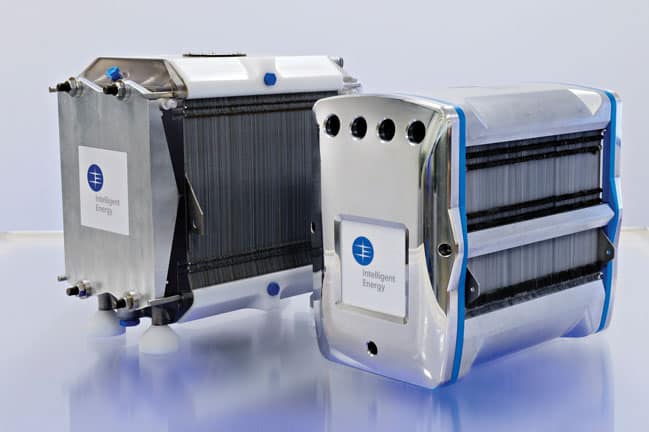Toyota’s announcement at CES in January certainly helped to move the needle on consumer awareness of fuel-cell electric vehicles (FCEVs). When the biggest automotive manufacturer in the world – a company that sold 10.2 million vehicles in 2014 – puts an offer of royalty-free technology on the table, it’s going to grab headlines. And that’s exactly what happened, with the news that thousands of fuel-cell-related patents were being made available ‘for free’ quickly jumping the often impassable divide between automotive technology media and mainstream consumer news, via business newswires on the way.
Those hoping for a vigorous anti-Toyota argument from the independent automotive fuel-cell sector here will be disappointed. Their marketing machine did a great job, choosing the fashionable Consumer Electronic Show instead of the obvious option of the venerable North American International Auto Show in Detroit the following week. They presented the media with a story about a huge number of patents, all available at no-cost for years to come. What was there not to be positive about?

Intelligent Energy welcomed Toyota’s announcement at the time and we stand by that sentiment. This kind of visibility is exactly what is needed to stimulate an informed debate that will drive greater understanding of the benefits that hydrogen fuel-cell technology brings to the automotive sphere. First-generation FCEVs are here now, and by the time the next generation of vehicles arrives around 2020, awareness will have increased significantly. But that doesn’t mean the fuel-cell technology industry can afford to sit back and wait for consumers to realise that FCEVs offer an attractive and practical zero-tailpipe-emissions solution.
Toyota’s patent announcement is good news for everyone involved and that includes those of us with competing or complementary technologies. But is free intellectual property (IP) a game-changer? Should we be worried? You may not be surprised to hear that there isn’t a simple answer to that, not least because there are two different aspects to Toyota’s arrangement, a factor that only became apparent when the detail was scrutinised – after the media excitement had faded.
One part of the deal is that Toyota will make available patents that apply to hydrogen refilling stations (HRSs), royalty free in perpetuity. So among those 5,680 patents, any of the knowledge that relates to refuelling infrastructure – essential for FCEVs to prosper – is there to be used. By anyone who wants to take advantage of it. Free of charge. Forever.
This is a lasting commitment that offers the wider industry a potential ‘kick-start’ as well as real long-term value. If motorists can easily refuel an FCEV, they are more likely to buy or lease it in the first place. Plans to install refilling infrastructure are gaining momentum in key markets and Toyota’s offer can only be seen as a positive move that will assist the process.
The other part of the offer relates to vehicle technologies, offered royalty free until 2020. This sends more powerful signals: here is a vehicle maker prepared to share the results of research and development that probably cost billions of dollars, which had been designed to give it an edge over the competition in an exciting new area of personal transport. All true to a degree, yes, even if there is a timeline attached, but there is more here to explore.
We are in an era where all the major companies involved in automotive fuel-cell technology are working together to drive early-stage growth in the FCEV market. We work with government and other stakeholders country by country, discussing standards, addressing challenges and planning the roll-out of an FCEV future together. In Britain, this operates as UKH2 Mobility and the process is mirrored throughout the world.
So there is already a significant element of co-operation. In many ways, the offer made by Toyota is similar to one of the business models that Intelligent Energy provides: the licensing of IP and technology is our bedrock. We can offer a similar commercial framework, working with vehicle makers on programmes based around our proprietary fuel-cell technologies that deliver the highest power density available.
And therein lies the reality. Technology patents are only part of the equation. In order to implement the technology as part of an electric driveline, a vehicle manufacturer needs to have access to the full scope of development activity needed to progress the programme. The likes of Toyota, Honda and Hyundai have that capability on their own. Others will follow a different route. By entering into the right partnership, a car manufacturer will receive the know-how and support it needs from a provider that can supply experienced engineering resources to complement existing in-house capability.
In offering to share its patented fuel-cell technologies at a vehicle level, Toyota has highlighted to manufacturers the attractiveness of the technology licensing route as a way to accelerate their entry into a market segment they cannot afford to ignore. The more momentum builds towards a hydrogen fuel-cell future, the better it is for the technology leaders involved – and the greater the potential benefits to the motorist and the environment.
James Batchelor is managing director of Intelligent Energy’s Motive division










Water Sector Talent Exodus Could Cripple The Sector
Maybe if things are essential for the running of a country and we want to pay a fair price we should be running these utilities on a not for profit...